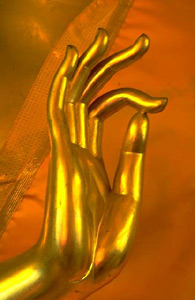 |
 |
|
THE MIRACLE OF EDUCATION |
"The spiritual path proceeds through the stripping away of all the inessentials in thought, word, and deed..." |
As you probably realize, the practice of "using fertilizer," appreciating the catalyst of daily life, and bringing all experience to the heart requires a quiet mind: we can't even identify our process in the midst of emotional turmoil. As my own path has developed over the years, the importance of staying centered on fundamental principles has become increasingly clear. It has become ever more apparent that the spiritual path proceeds through the stripping away of all the inessentials in thought, word, and deed. It is important to realize that there are primary teachings and there are secondary teachings (the latter being what RA sometimes referred to as "transient information' concerning spiritual trivia). Teachings that are primary lead us to ever-deeper self-integration, and they form the core of all mystic traditions. I recently read one of the classics of Buddhism in translation, a work called The Wisdom of the Early Buddhists by Geoffrey Parrinder (New Directions 1977), which is a collection of the oldest Pali-language scriptures from the time of Siddhartha Gautama, the man whom we call "the Buddha." The more I read, the more I could appreciate the purity of his teachings, which are by all means "primary" and show us a true path. As opposed to much of what can be found today under the catch-all New Age banner, these early teachings were path-centered. The individuals who became monks around the Buddha were taught not to waste time in either needless activity nor idle discussion: their entire lives were spent in meditation and mind-training. One passage in this book is particularly instructive, especially if we relate it to current information concerning the 1001 details of UFO/ET phenomena. This story sheds a clear light on what the Buddha himself deemed essential, more or less in his own words: |
|
The Buddha told Kevaddha that there are three sorts of miracles:
|
|
If we look deeper at this Miracle of Education, we can see just what "path-centered" really means: holding firm to the primary teachings of enlightenment and transformation. If that's our aim, then we have to be discerning and able to put spiritual trivia in it's place. To be sure, negative ET conspiracies, black-budget secret technologies, ship sightings and cosmic history are interesting, but are they essential primary teachings? Do they conduce to our liberation and freedom from needless suffering? Do they really bring self-integration, fusion with true self, and the flower of love and wisdom? Of course not -- and it would be most useful to remember this... In this light, it becomes obvious that much of what passes for cutting-edge UFO information is secondary, and has more to do with the first two minor miracles described above. In and of itself, it's not particularly important to spend a lot of time wondering about alien magic (i.e. passing through walls, levitating, or scanning thoughts). Perhaps we should think more about the spiritual progress needed to achieve such powers of mind. Of course, to the monks in ancient India who followed the Buddha's teaching, these abilities were not considered important at all. As all yogis know, they are simply by-products of higher consciousness, just signposts on the Way. The real question, as always, is simple: "Is it essential or not?" If our interests and studies lead us to greater joy, peace, clarity, and freedom from suffering, then they're quite worthy of our time and attention. If we subject all our current studies and sources of information to such a standard, we'll save a lot of time. More than that, we can also be sure then that our spiritual path is straight, centered, and grounded in the real. The entire teaching of the Buddha (and of all true Masters) had one single, central goal which we would all do well to ponder: |
|
|
|